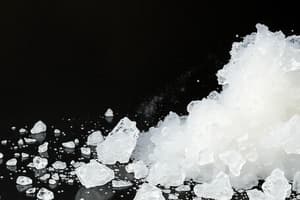Podcast
Questions and Answers
What is chemistry?
What is chemistry?
Science that deals with the composition, structures, and properties of matter, and how matter changes under different conditions.
What is combustion?
What is combustion?
Rapid oxidation of a substance, accompanied by the production of heat and light.
What are compound molecules?
What are compound molecules?
A chemical combination of two or more atoms of different elements in definite (fixed) proportions.
What is an element?
What is an element?
What is an elemental molecule?
What is an elemental molecule?
What is an emulsifier?
What is an emulsifier?
What is an emulsion?
What is an emulsion?
What are exothermic reactions?
What are exothermic reactions?
What is glycerin?
What is glycerin?
What does immiscible mean?
What does immiscible mean?
What is inorganic chemistry?
What is inorganic chemistry?
What is an ion?
What is an ion?
What is ionization?
What is ionization?
What does lipophilic mean?
What does lipophilic mean?
What is matter?
What is matter?
What does miscible mean?
What does miscible mean?
What is a molecule?
What is a molecule?
What is an oil-in-water emulsion?
What is an oil-in-water emulsion?
What is organic chemistry?
What is organic chemistry?
What is oxidation?
What is oxidation?
What is oxidation-reduction?
What is oxidation-reduction?
What is an oxidizing agent?
What is an oxidizing agent?
What is pH?
What is pH?
What is the pH scale?
What is the pH scale?
What is a physical mixture?
What is a physical mixture?
What are physical properties?
What are physical properties?
What is a pure substance?
What is a pure substance?
What is a reducing agent?
What is a reducing agent?
What is reduction?
What is reduction?
What is a reduction reaction?
What is a reduction reaction?
What are silicones?
What are silicones?
What is a solute?
What is a solute?
What is a solution?
What is a solution?
What is a solvent?
What is a solvent?
What are the states of matter?
What are the states of matter?
What are surfactants?
What are surfactants?
What are suspensions?
What are suspensions?
What is thioglycolic acid?
What is thioglycolic acid?
What are volatile alcohols?
What are volatile alcohols?
What are volatile organic compounds?
What are volatile organic compounds?
What is a water-in-oil emulsion?
What is a water-in-oil emulsion?
Why do we need to study chemistry?
Why do we need to study chemistry?
What is the difference between organic and inorganic?
What is the difference between organic and inorganic?
What is an acidic solution?
What is an acidic solution?
What is an alkaline solution?
What is an alkaline solution?
What are alkalis?
What are alkalis?
What are alkanolamines?
What are alkanolamines?
What are alpha hydroxy acids?
What are alpha hydroxy acids?
What is ammonia?
What is ammonia?
What is an anion?
What is an anion?
What are atoms?
What are atoms?
What is a cation?
What is a cation?
What is a chemical change?
What is a chemical change?
What are chemical properties?
What are chemical properties?
What are examples of elemental molecules?
What are examples of elemental molecules?
What are examples of compound molecules?
What are examples of compound molecules?
What are examples of physical properties?
What are examples of physical properties?
What are examples of chemical properties?
What are examples of chemical properties?
Flashcards are hidden until you start studying
Study Notes
Basics of Chemistry
- Chemistry studies the composition, structure, properties of matter, and how matter changes under varying conditions.
Combustion
- Defined as the rapid oxidation of a substance, resulting in heat and light.
Molecules and Compounds
- Compound molecules are combinations of two or more atoms of different elements in fixed proportions.
- Elemental molecules consist of two or more atoms of the same element in fixed proportions.
Elements
- Elements are the simplest form of chemical matter and cannot be broken down without losing their identity.
Emulsifiers and Emulsions
- Emulsifiers bind incompatible materials into a stable blend.
- Emulsions are unstable mixtures of immiscible substances combined with an emulsifier.
Reactions
- Exothermic reactions release significant heat.
- Oxidation involves combining a substance with oxygen to produce an oxide.
- Reduction occurs when oxygen is removed or hydrogen is added to a substance.
Properties of Matter
- Physical properties can be determined without chemical reactions (e.g., color, size, weight).
- Chemical properties only identified through chemical reactions.
Types of Chemistry
- Inorganic chemistry studies substances without carbon, while organic chemistry focuses on carbon-containing compounds.
Solutions and Mixtures
- A solution is a stable mixture of two or more substances.
- Suspensions are unstable mixtures with undissolved particles.
pH and Acidity
- pH (potential hydrogen) indicates the acidity or alkalinity of a solution, ranging from 0-14.
- A solution below pH 7 is acidic, while above pH 7 is alkaline.
Matter
- Matter is any substance that occupies space and has mass.
- States of matter include solid, liquid, and gas.
Chemical Compounds
- Solutes are substances dissolved in a solution, while solvents are the substances that dissolve solutes.
Surfactants
- Surfactants are agents that allow oil and water to mix by reducing surface tension.
Unique Components
- Glycerin is a moisturizer and solvent in skincare products.
- Silicones are special oils used in hair and skin products.
- Thioglycolic acid is used in permanent waving solutions.
Ions and Charges
- Ions are atoms or molecules with an electrical charge; anions are negatively charged while cations are positively charged.
Volatile Compounds
- Volatile organic compounds (VOCs) are carbon-containing compounds that easily evaporate.
Acid-Base Chemistry
- Alkaline solutions have a pH above 7, whereas acidic solutions have a pH below 7.
- Alkaline substances can neutralize acids or raise the pH of products.
Hydroxy Acids
- Alpha hydroxy acids (AHAs) are plant-derived acids used for skin exfoliation.
Importance of Chemistry
- Understanding chemistry is crucial for using products effectively on clients.
Studying That Suits You
Use AI to generate personalized quizzes and flashcards to suit your learning preferences.




